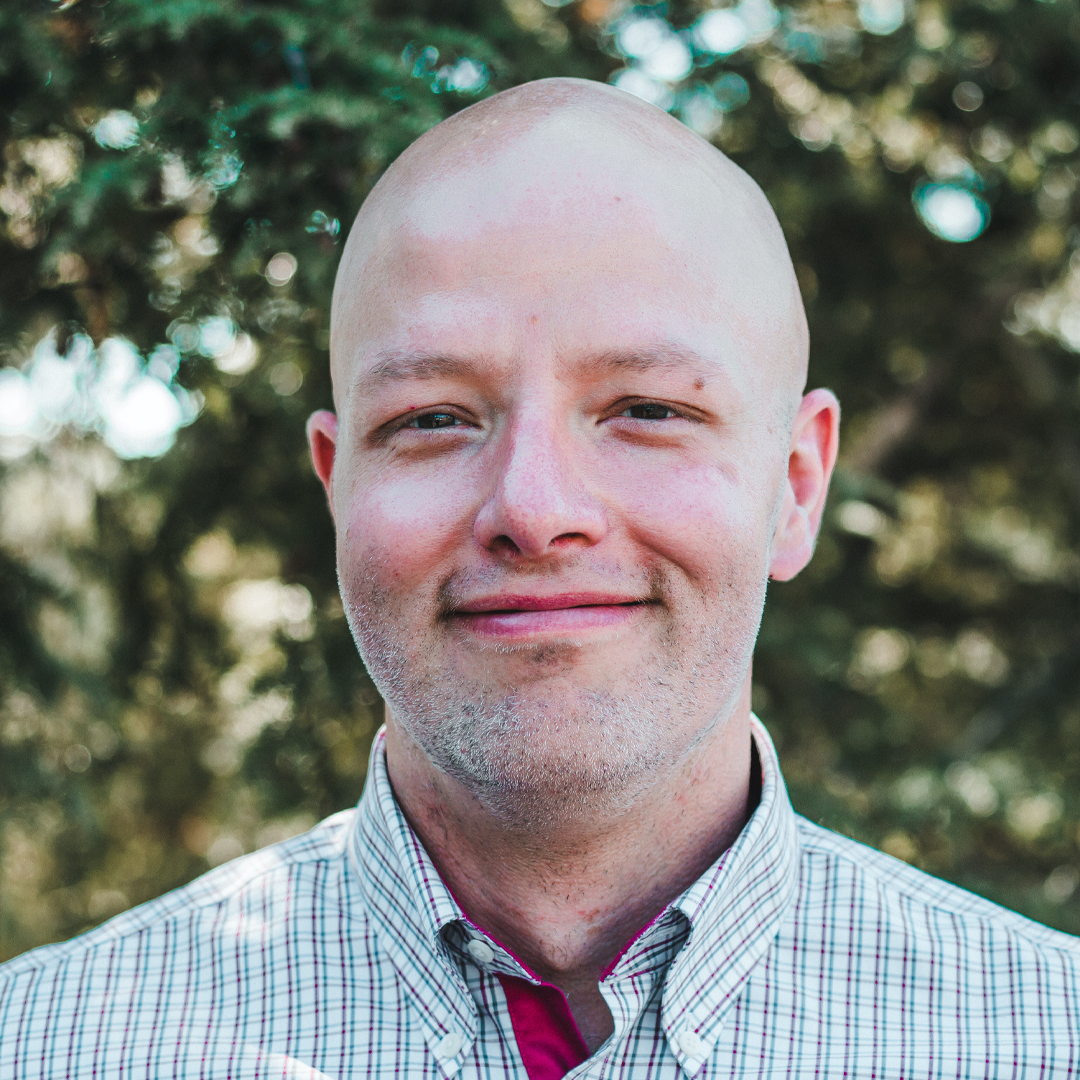
Rev. Adam Davidson
Adam Davidson is the lead pastor of Renovation, a Free Methodist church with sites in Portage and Kalamazoo, Michigan. He produces a daily (Monday-Friday) three-minute video devotional called RadCast, posted on YouTube, Facebook and radamdavidson.com. He recently started coachmypreaching.com to come alongside pastors who want to keep developing as public speakers.
by Rev. Adam Davidson
When I was a wee lad, I remember seeing a sign for a dry cleaner that would “Martinize” your clothes. As it turns out, it was for a dry cleaning place/approach called, well, Martinizing, that’s still around (martinizing.com). What a funny word (to me)! To “Martinize” something sounds like the act of making it into Martin, as in, “Look at me, I’m now Martin Short — I’ve been Martinized!” Or maybe it means spreading the gospel to Mars (not the hill, the planet) where Martians live. I think about this whenever I see a “One Hour Martinizing” place in a strip mall, usually occupying the space next to a Subway or a Goodwill thrift store — proselytize, Martinize, foot-long, used bowling balls.
I think in weird ways. I can’t help it. When I hear the word “proselytizing,” I immediately think of dry cleaning. A quick check of dictionary.com tells us that a proselyte is “a person who has changed from one opinion, religious belief, sect, or the like, to another; convert.” Therefore, to proselytize someone is to convert a person. This is scientific-y language meant to describe what the church is called to do — namely, to convert people into followers of Jesus.
Admittedly, proselytizing is a church word, like hymnal or narthex or unspoken prayer request. Normal people don’t talk like this. It’s good to keep this in mind because, if you were to say to a pagan co-worker, “I’d like to proselytize you,” it’s going to be your unspoken prayer request in next week’s bulletin. Bulletin is also a church word.
Proselytizing, converting, evangelizing … no matter what you call it, Jesus clearly tells us to tell the world and make disciples. We’ve been doing that for a good 2,000 years with some success. In the past 200 years, for better or worse, the church has had a stronger emphasis on initial conversion (justification) at the expense of transitional conversion (sanctification), tilting our view of discipleship too much toward heaven and not so much toward the here and now of the kingdom. I’ve been a pastor for a while now — not so long that I only drive Buicks, but long enough to have a gray beard and no hair. I don’t yell at kids to get off my lawn, but I’m still unclear on what a meme is (just kidding) (sort of). All that to say, I was around and in pastoral ministry when the emphasis was pretty much on evangelism — making the decision — and then hoping to get them baptized and hopefully in a small group, or at least assistant usher.
If you were to go back to the old tapes — literal cassette tapes — of messages I gave early on in ministry, you would hear an emphasis on spending eternity in heaven, perhaps even at the expense of how following Jesus affects our life today. It’s not that I didn’t believe that/teach that/pastor that way, it’s just that I was far more familiar with evacuation theology than I was with sanctification.
I don’t think I was alone in this approach. It surely wasn’t for a lack of teaching on anyone’s part that I missed the importance of holy living as a disciple of Jesus. I distinctly remember sitting in a class with Darold Hill as he taught us ordinands (people in the process of becoming ordained — another church word) about salvation’s effect on us in the day-to-day. I recall a brief but meaningful conversation with Bishop Emeritus Leslie Krober about the word synergy (not exclusively a church word) and the importance that we “work out our salvation with fear and trembling” (Philippians 2:12) on our daily journey with Jesus. We Free Methodists are, after all, part of the rich holiness tradition, a tradition that sees discipleship as the process of becoming like Jesus (justification + sanctification). Looking back, I think I was more concerned about eternity than I was developing the fruit of the Spirit.
The Free Methodist Church has a DNA (to echo Howard Snyder) that includes a fuller view of salvation as both justification and sanctification. The Free Methodist church I pastor, Renovation, tries to articulate this in our mission statement: “We exist to help people find, follow, and be like Jesus.” While I wouldn’t say that everyone in our congregation “gets it,” I can attest to the fact that we’re well along in sorting this out. I’m under spiritual renovation, just like the lot of us. But we’re still growing. Just because it’s a mission statement, it doesn’t mean that we live it out. But, with God’s help, we’re trying (synergy) and coming along (sanctification) as we follow Jesus together as a church.
In his book “Rethinking Holiness,” author Bernie A. Van De Walle writes about the 20th century emphasis on the eternal state of one’s soul. “With such an emphasis on one’s eternal destiny, such approaches show little understanding of, and therefore little concern for, the consequences that God’s saving work may have here and now” (fmchr.ch/vandewalle). In other words, much of the church’s attention in the past few hundred years has been given to the faith decision rather than the faith journey.
The Apostle Paul reminds us that “it is God who works in you to will and to act in order to fulfill his good purpose” (Philippians 2:13). A favorite prayer of mine comes from a collect (church word for a short liturgical prayer, not the offering as some might guess). The prayer goes like this: “…in all we do, direct us to the fulfilling of your purpose, through Jesus Christ our Lord. Amen.”
Ticket to Heaven?
Jesus has tasks He wants to fulfill through me today. The kingdom of God needs to be spread to a little corner of my broken world before I go to sleep tonight. There is an urgency to following Jesus — to discipleship — that threads through Scripture and church history. The only reason I am a follower of Jesus today is because someone before me was bold enough to ask God to use them that day to plant a church, which shared the gospel, which preached repentance, which led to a conversion, which then led to that person (proselyte) obeying Jesus and moving forward according to the kingdom plan.
In other words, it’s a good thing Jesus didn’t evacuate that person to heaven the moment he repented. It makes me think that they probably didn’t sing “I’ll Fly Away” as the closing song. There’s nothing wrong with that hymn per se, except that it might be a culprit in emphasizing the idea that earth is merely God’s waiting room — what a diminished view of the gospel; what a limiting way to view the kingdom of God. I’m thankful that proselytes didn’t wait but went out carrying the healing power of Jesus to my little broken world.
It’s almost like … instead of going to heaven, heaven comes to us. This is very different from my initial view of discipleship. Dallas Willard, N.T. Wright, and others have helped me understand the principle that the kingdom of God is here now, active, healing and good. To wait would be to miss it. To act obediently is to participate in it. I wish I understood this more. Nonetheless, I do feel like I’m in the middle of a mini-transformation in my journey with Jesus. I’ll go out on a limb and share just one example from my own life, in hopes that it might be an encouragement to you.
When I was 13, I knew that God was calling me into ministry. I was a good kid, helpful at church, trouble-free since ’93. Friends in youth group called me Pastor Adam. One of my big graduation gifts was a set of William Barclay commentaries. Incidentally, I bet they didn’t know Barclay’s view on some things; otherwise they would’ve bought me “I Kissed Dating Goodbye” or something by Rick Warren — “Purpose-Driven Graduation” perhaps.
Anyway, all this attention and encouragement (which is good) kind of made me feel somewhat elite (which is bad). I wanted nothing to do with sin or sinners. I openly judged people who smoked, drank and played cards while hiding my own sin and shame for fear that I might get called out for my own sin which was far worse. When I did acknowledge my sin, my first and only concern was — you guessed it — whether I’d lost my salvation. “If you died today, would you go to heaven?” was a typical line from shock-jock evangelists. Don’t get me wrong, that’s a fair question, but it again supports the idea that discipleship is about getting a ticket to heaven.
Fan to Follower
When our daughter Lexi was born, we were floored when we got the diagnosis of Down syndrome and later autism. That really took me down a couple of pegs. I freely admit that, until we had Lexi, I had no interest and (forgive me, Lord) no compassion for people in the special needs community. They made me uncomfortable. Our situation left us no option but to change. It was around this time that my relationship with Jesus started to flood my day-to-day living beyond compartmentalized discipleship, the kind fueled by brief “My Utmost for His Highest” devotional readings and a presentable exterior. God, full of grace and truth, was working on me in new and powerful ways. I was learning more about being an active disciple, fully present to the Spirit of Jesus.
Suddenly, so many passages in Scripture made sense. So many dear brothers and sisters in the Lord spoke godly encouragement that filled my soul. So many other families, hereunto invisible to me, became visible. My heart was softening, my outlook was changing, my life was being transformed. Instead of lifting me out of it, Jesus led me through it and continues to do so, faithfully, like the Good Shepherd that He is.
I believe that Lexi helped me transition from fan to follower of Jesus, from somewhat compartmentalized to completely flooded with God’s grace, from convert to active disciple. I know my heart is changed because my view of others has changed, and continues to change, as Jesus roots out deeply held beliefs and biases that distort the image of God in the people around me. Looking back, I wish I hadn’t been so icy toward people who weren’t in the same place theologically/physically/cognitively as I was. I am more like Jesus because of Lexi. What might God be using in your life to get you from following to becoming like Jesus?
As we help people find, follow and be like Jesus at Renovation Church, we continually ask: How do we make sure we’re making disciples and not proselytizing converts (or, for that matter, Martinizing them)? It’s in making sure that we talk about how following Jesus changes us today. We hear people confessing sin and being real. We see people praying bold and risky things like “I’m still growing but I’m stuck” or “I’m more like Jesus than I was a year ago” or “I want to be the husband and dad that my wife and kids need, so I’m letting go of anger and modeling my life after Jesus.”
It’s stuff like this that keeps the journey of discipleship as a way of living and not a checkbox to make sure our eternity is safe. Following Jesus renovates us. Through our own brokenness, God’s healing changes us as we go (2 Corinthians 3:18). Spiritual formation is always happening to us. If we’re constantly changing, why not change into the likeness of Jesus (Romans 8:29)?
We don’t proselytize (or Martinize). We try to disciple. As a pastor, I’m talking less about heaven and more about the kingdom here and now. I’m talking less about eternal security (the Methodist version) and more about daily obedience. That’s why Renovation’s mission statement ends with “be like Jesus.” I want to be the person that Jesus is calling me to be today. Becoming that person is a process littered by failure but overwhelmed with grace. I believe that, no matter what, any person can find Jesus. Anybody can follow Jesus. And, through the love of the Father, the grace of the Son, and the fellowship of the Spirit, anybody can live like Jesus. Here and now. Today.
Jesus called disciples not to conversion but to followership. “Follow me,” He said, “and I will send you out to fish for people” (Mark 1:17). It’s not evacuation to heaven. It’s not even just a decision. It’s discipleship, and there’s work to be done in the world and in me, and that work began the moment Jesus called them. Otherwise, Jesus would’ve said to a couple of fishermen, “You guys believe? You do!?! Good — see you in heaven!”+

R. Adam Davidson
Adam Davidson is the lead pastor of Renovation, a Free Methodist church with sites in Portage and Kalamazoo, Michigan. He produces a daily (Monday-Friday) three-minute video devotional called RadCast, posted on YouTube, Facebook and radamdavidson.com. He recently started coachmypreaching.com to come alongside pastors who want to keep developing as public speakers.









